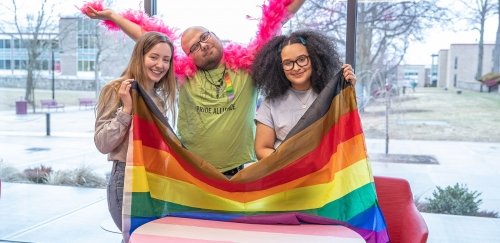Student Advocacy Spurs New Queer Studies Minor
- News & Events
- News
- Student Advocacy Spurs New Queer Studies Minor

"Continue the revolution," urges Derek Sherlock, "that people like Marsha Johnson and Sylvia Rivera started in the queer community 50 years ago." (From left, Madeleine Dulude, Derek Sherlock and Sissy Rosso)
RIC has a new minor in queer studies, thanks to the initiative of a small group of students. An umbrella term, "queerness" is broadly used to refer to individuals and identities that are currently understood as culturally non-normative, such as lesbian, gay, bisexual, transgender, intersexed, asexual and others.
The idea for this minor was born during a pilot course the students were taking titled "Introduction to Queer Studies" taught by Associate Professor of Psychology Andrea Dottolo. Dottolo invited Leslie Schuster, chair of the Gender and Women's Studies Program, to class, where the students pitched their proposal.
"They presented a strong rationale for building space at Rhode Island College for the study of a discipline that is typically excluded from academic studies," Schuster said. "This minor is a testament to their ability to organize and advocate for the study of the experiences and struggles of queer people."
Three of the minors' advocates are seniors Derek Sherlock, Sissy Rosso and Madeleine Dulude.
Sherlock, who is a dual major in English and gender and women's studies, is relieved that "queer theory and queer issues will finally have a place at the college." "It's been too long," Sherlock said.
An interdisciplinary field of study, queer studies will examine the histories, lives, identities, experiences and struggles of queer people. It consists of 19 to 20 credit hours of required courses and electives that cover everything from the impact of race, class and gender to sexual and gender identity formation. These courses are intended to challenge students to think critically about human diversity, including the role of intersectionality (overlapping and intersecting social identities).
"We talked about intersectionality in Professor Dottolo's class," Rosso said, a double major in psychology and gender and women's studies. Rather than one identity, people have multiple, intersecting identities that include gender, race, ethnicity, class and sexuality.
Intersectional theory asserts that people are often disadvantaged by multiple sources of oppression; therefore, it's important to be sensitive to differences both within and among groups. "Trans women of color, for example, are killed [as a result of prejudice] at a much higher rate than any member of the LGBTQ+ community," she said. "So even within the LGBTQ+ community there are unique differences."
These advocates also wanted the courses to be interdisciplinary, drawing knowledge from several fields. Offerings include a queer and trans anthropology course as well as a course in queer cinema.
As a future English teacher, Dulude believes it's important that students learn to think across boundaries. She is currently completing student teaching at North Providence High School. "Much of the work with literature and writing is both a witnessing of the experiences/realities of others and an invitation to explore one's own," she said.
"In our queer studies course with Professor Dottolo, we worked a lot with this idea of welcoming in experiences and realities that are outside the dominant narrative. The class also pushed me to confront and challenge my understanding of what society defines as normal. As a future teacher, I hope to cultivate conversations in the classroom that reflect my students' lived experiences," said Dulude.
After graduation, Rosso is planning to enroll in a Ph.D. program in clinical psychology to engage in research on LGBTQ+ people of color and trauma intervention, while Sherlock wants to contribute to the LGBTQ+ community in any way possible, be it as a case manager for youth or working for an organization advocating for laws that protect the transgender population.
Sherlock's hope for the next wave of queer students at RIC is to "continue the revolution that people like Marsha Johnson and Sylvia Rivera started in the queer community 50 years ago. Show the RIC community that we are here, we are queer and we are not going anywhere."
